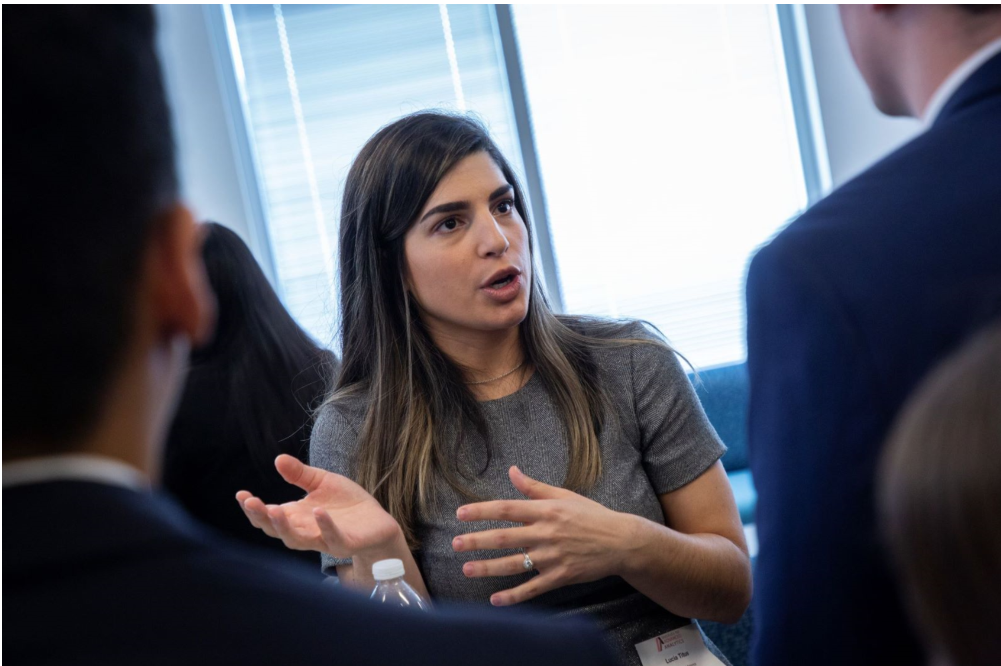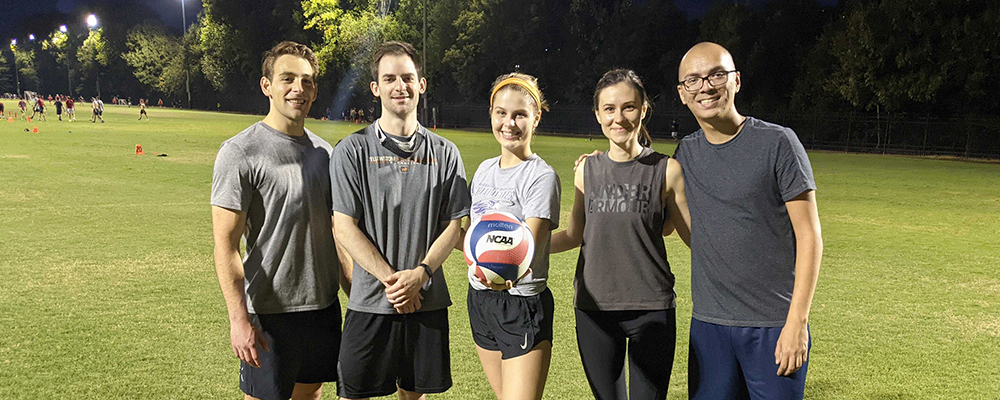The Institute’s admissions team regularly receives inquiries from prospective students along the lines of: “I’m interested in the MSA program, but I’m a ________ major. Do I even have a chance of being admitted?” One can fill in that blank with any number of disciplines — marketing, physics, textile engineering — and the answer is always, “Yes, you have a chance.”
Over the next few months, we will shine a spotlight on alumni with diverse academic and professional backgrounds to reveal how the interdisciplinary lens through which they view the world aided them in the MSA program and beyond.
Lucia Titus completed undergraduate degrees in economics and political science at the University of Virginia and a master of international studies at NC State. Her capstone project for the latter focused on how the US intelligence community can leverage data derived from social media applications to build predictive models of social unrest in foreign countries. In her application for admission to the MSA program, Titus acknowledged, “My research would have undoubtedly benefited from my having data analytics skills to begin working toward developing such models.”
As an MSA student, Titus expanded her toolkit to include the analytics skills she desired. Along with four teammates — whom she described as “the dream team” — she applied her newfound quantitative skills on a practicum project sponsored by Asurion, a preferred provider of technology protection to the world’s largest wireless carriers, trusted retailers and popular device manufacturers. Since completing the MSA in May 2018, Titus has worked as a data scientist for Bank of America in Charlotte. We spoke with her days before she graduated, and reconnected with her recently to find out how her career is progressing.
While you completed some data science short courses and a non-degree statistics class in preparation for the MSA, you didn’t have a great deal of technical experience coming in. What were the challenges and benefits of your background as you made your way through the MSA program?
I encountered many more benefits than challenges as a result of my non-technical background. While I was concerned that it would take a great deal of work just to keep up with my peers, let alone excel in the program, this did not prove to be the case during my time at the Institute. If anything, I think my background was highly beneficial during team projects, engagements with our practicum sponsor, and discussions with potential employers. I oftentimes approached work from a different perspective, I suggested unique ideas, and was able to effectively influence my teammates, peers, and audiences.
Tell us a little about the work you’re doing now at Bank of America. What do you enjoy most about your role?
At Bank of America, I am a data scientist in the Consumer & Small Business Client Protection organization, where I work on exciting and varying business problems to identify and mitigate financial crimes. Specifically, I support our business partners in strategies related to anti-human trafficking and high risk financial centers. I also support our ongoing engagement with the Institute through our yearly sponsorship of practicum projects and, this year, I’ve played a large role in our organization’s response to the CARES Act. What I enjoy most about my role is the opportunity to work on meaningful business problems using varying data science tools and techniques — from database querying to model development and everything in between!
You’ve interacted with MSA students as an alumna and Bank of America representative. What is it like being on the employer side of an Analytics in Practice (AIP) session or job interview? What advice do you give to MSA students navigating the program and job search?

Being on the employer side is a very fun and engaging experience — and much less stressful than being on the other end! I really enjoy engaging with the students and hearing all the different questions that come our way during the AIPs. I especially enjoy hearing our candidates work through the technical case studies during our job interviews and getting a better understanding of the ways they approach problems analytically.
The advice I would give to students during the job search is to make yourself known to employers, especially in today’s environment where you don’t have the opportunity to engage with them face-to-face. Reach out to hiring managers or team members and ask for some of their time to ask meaningful questions and tell them about your background and interests. You should expect to lead these conversations, so have a strategy and purpose in place so that they will remember your name, your interest, and why you’d be a great fit for their team. I’ve had many interactions with interested students since being on the other side and great interactions always made a difference when it came time to choose who we wanted to interview.
While in the program, my advice is to be a good team player — be someone who others are eager and happy to have as part of the team. This means working hard (and smart!), sharing your knowledge with others, considering different strategies and ideas, and being comfortable with letting go of some control.
How do you enjoy spending your time outside of work?
I enjoy doing little getaways with my husband around the area — we’ve taken quite a few trips to the mountains in Asheville and back to my alma mater in Charlottesville, Virginia during this new era of social distancing. I also love spending time with our friends — now in parks and backyards instead. Once life gets back to normal again, I’m really looking forward to visiting our families, ski trips, overseas travels, and group fitness classes. In the meantime, I’ve also definitely been spending time on Netflix binging on shows like The Queen’s Gambit!
Data Column | Institute for Advanced Analytics
The Collaborative Blog for Students in the Master of Science in Analytics
